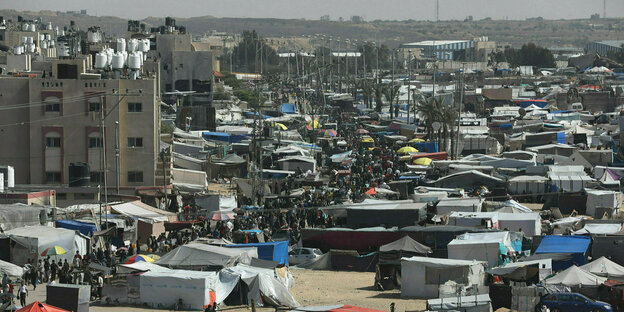There has been peace between Israel and Egypt since 1979. The offensive against Rafah is testing relations between the countries.

Oppressive confinement: a camp for displaced Palestinians in the middle of Rafah Photo: Omar Ashtawy/dpa
CAIRO taz | Alarm bells are ringing in Cairo. For weeks, the Egyptian government had warned of an Israeli military operation in the Palestinian city of Rafah, on the southern edge of the Gaza Strip. The Egyptian side now observes with great anger the Israeli attack on Rafah, which has been expanding for days, and the Israeli seizure of the border crossing with Egypt.
There is an ice age between Egypt and Israel, the likes of which the two countries have not experienced since the signing of the Camp David Peace Treaty in 1979. In an initial reaction, Egypt suspended security cooperation with the Israeli military on the border. . This also applies to all aid supplies for the Gaza Strip that were delivered through Egypt and with Israel's consent: without coordination, there are no deliveries.
In a second step, Egypt has announced that it will join South Africa in its lawsuit before the International Court of Justice in The Hague accusing Israel of genocide against the Palestinians. Cairo is also reportedly considering downgrading relations with Israel and withdrawing the Egyptian ambassador from Tel Aviv.
Concern over Egypt's withdrawal
Hisham Hellyer, who analyzes the situation for the Carnegie Foundation and the Royal United Services Institute for Defense and Security Studies in London, said: “The Egyptians are looking for a way to return to the old status quo before the Israeli army took over. border control. crossing. And they are doing everything they can.” It's not just about taking control of the border crossing, Hellyer says. “We are talking about an Israeli invasion of Rafah. The idea that it is not yet in full swing and that it is only a limited military operation is ridiculous,” he tells Taz.

This text comes from Laborable day. Our left-wing weekly! Every week, wochentaz is about the world as it is and as it could be. A left-wing weekly with a voice, attitude and a special vision of the world. New every Saturday on newsstands and of course by subscription.
He also maintains, as does the Egyptian media, that the Israeli attack on Rafah violates existing treaties between Egypt and Israel, which establish a type of demilitarized zone in the immediate border area, in which certain types of heavy weapons that the Israeli army Just having there in use is prohibited.
Egypt doesn't have much room for maneuver, says Hellyer. “She has clearly expressed her opposition to the Israeli military campaign in Rafah and has called on her Western allies to put more pressure on the issue. “Egypt has few means to exert pressure on Israel,” she explains.
There is also concern in Israel about increasingly cold relations. This is what the Israeli newspaper reports Haaretz over concerns by Israeli government officials that Egypt, the main mediator along with Qatar in the ceasefire negotiations between Hamas and Israel, may withdraw from them.
Hisham Hellyer believes this makes little sense from the Egyptian perspective. “The Egyptian government does not want to have less contact with Israel from a strategic point of view. “They have to mediate, they have to get involved to find ways to de-escalate the situation.”
Concern about mass exodus
Egypt's biggest concern remains the possibility of a mass exodus of people from Rafah to Egypt. “If there is a mass expulsion, it means that Egypt is becoming part of an ethnic cleansing, voluntary or against its will,” Hellyer says, describing the Egyptian panic.
After all, he adds, there is not a single example in Palestinian history of people who have left their homes and been able to return later. Egyptians also fear that this will seriously damage the entire Palestinian issue. “If the Palestinians are expelled from the Gaza Strip, talk of a two-state solution no longer makes sense,” says Hellyer.
With the Israeli takeover of the Rafah border crossing, another problem now arises: even if the Israeli army were willing to withdraw from there, there is no plan for what would happen then. Who should then be in control there? Israeli plans are circulating for Palestinians who are not affiliated with Hamas to take control without defining it. Furthermore, the Palestinian self-governing authority in the West Bank should be given a role there in a sort of “supervisory body.” She has already rejected him.
Hellyer describes such plans as grotesque. The problem Israel has with the border crossing and who controls it afterward is symptomatic of all of Israel's post-war plans that are circulating, she says: “They all make no sense.”
Concern about the peace treaty
The basic problem is that with all these plans, Israel wants to retain security control over the Gaza Strip. Anyone who was deployed to Israel – whether undefined groups of Palestinians outside Hamas, Arab or international peacekeepers – would immediately have the reputation of policing as a collaborator of the occupation.
After all, Hellyer does not currently see the Camp David Peace Treaty between Israel and Egypt, one of the “most important elements of the regional security architecture,” in immediate danger. “Egypt depends on it. The region depends on it. It would be very dramatic to attack this. But would it be completely unthinkable? “He asks, pauses briefly and answers himself: “No, it is not completely unthinkable.”
